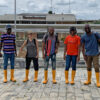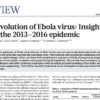 Infectious disease outbreaks continue to pose challenges to global health and security, prompting reactive countermeasures. Recently, severe outbreaks of Ebola and Zika virus were designated by the World Health Organization as “Public Health Emergencies of International Concern.” Other emerging viral pathogens have warranted similar attention, including virus outbreaks from Lassa, Chikungunya, avian influenza, Nipah, SARS, and MERS. Additionally, endemic human pathogens, such as dengue and West Nile virus, have expanded to new regions due to changing demographics and increased urbanization. Recently there has been a lot of focus on “Parachute Research“, where foreign researchers “parachute” into countries affected by infectious disease outbreaks, such as Zika and Ebola. These researchers then conduct research in isolation, and depart without creating sustainable infrastructure or a lasting impact in the affected countries. In a recent commentary in the journal Cell, we instead advocate for the creation of long-term sustainable collaborations in outbreak-prone areas of the world.
Infectious disease outbreaks continue to pose challenges to global health and security, prompting reactive countermeasures. Recently, severe outbreaks of Ebola and Zika virus were designated by the World Health Organization as “Public Health Emergencies of International Concern.” Other emerging viral pathogens have warranted similar attention, including virus outbreaks from Lassa, Chikungunya, avian influenza, Nipah, SARS, and MERS. Additionally, endemic human pathogens, such as dengue and West Nile virus, have expanded to new regions due to changing demographics and increased urbanization. Recently there has been a lot of focus on “Parachute Research“, where foreign researchers “parachute” into countries affected by infectious disease outbreaks, such as Zika and Ebola. These researchers then conduct research in isolation, and depart without creating sustainable infrastructure or a lasting impact in the affected countries. In a recent commentary in the journal Cell, we instead advocate for the creation of long-term sustainable collaborations in outbreak-prone areas of the world.
International research collaborations are essential in combating major public health emergencies. Failure to collaborate can delay critical findings, hamper outbreak response, and erode trust between institutions and nations. In the commentary, we draw on our experience establishing the Viral Hemorrhagic Fever Consortium and the African Center of Excellence for Genomics of Infectious Disease in West Africa and show how “rooted” collaborations can assist during public health emergencies. Recognizing that many successful infectious disease research collaborations exist, we highlight their critical and often unheralded role in mitigating and preventing infectious disease outbreaks.
Abstract
International research collaborations are essential in combating major public health emergencies. Failure to collaborate can delay critical findings, hamper outbreak response, and erode trust between institutions and nations. In this commentary, we expand on recent discussions on the lack of openness during public health emergencies and perceived exploitation of disease-stricken countries by “parachute researchers”. We draw on our experience establishing the Viral Hemorrhagic Fever Consortium and the African Center of Excellence for Genomics of Infectious Disease in West Africa and show how “rooted” collaborations can assist during public health emergencies. Recognizing that many successful infectious disease research collaborations exist, we highlight their critical and often unheralded role in mitigating and preventing infectious disease outbreaks.
Links
Paper in Cell
PDF version of paper
The Viral Hemorrhagic Fever Consortium
African Centre of Excellence for Genomics of Infectious Diseases








